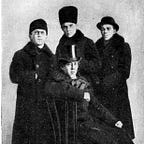Writing as Philosophy; or About The T in Philosophy
The word challenges you as the ultimate reflection of both the practical and the theoretical you.
It joins you early in life but when you try to remove it, like gum on shoe, you can’t.
If you learn to meditate and seek silence, you might find it; wordless existence.
But you can’t describe the world without the word. You might paint a landscape or take a picture, but you’ll still be using words. Let’s say you take a picture of words of words you don’t understand. If you can reflect and consider the picture, you’re doing so with words. If you concede the pictures as part of you, you’re doing so with words.
Let’s say you enter a recursion without beginning with word and/or ending in word, how would we know?
Heidegger drank tea and saw philosophy. But how do we know? Because of words.
How do we know ourselves? Because of words.
What’s in a word? The self?
Is writing a reflection of self? What’s reading?
Cat’s chase of a toy seems kinda mathematically smooth when the toy is moving in predictable behavior and the cat adjusts its strategy to maximize this pattern recognition, but abrupt changes causes the cat to make consideration within its participation.
Hegel’s Coming Yo!: On The Eternal Negation
Hop off the Regal with something illegal
This shit will lift you and whatever’s beneath you
- Mumbles
On the “phenomenological” level, then, Negativity is nothing other than human Freedom-that is, that by which Man differs from animal. But if Freedom is ontologically Negativity, it is because Freedom can be and exist only as negation. Now in order to negate, there must be something to negate: an existing given and hence an identical given-Being. And this is why man can exist freely-that is, humanly — only while living as an animal in a given natural World. But he lives humanly in it only to the extent that he negates this natural or animal given. Now negation is realized as accomplished action, and not as thought or simple desire. Hence it is neither in his more or less “elevated” “ideas” (or his imagination), nor by his more or less “sublime” or “sublimated” “aspirations” that Man is truly free or really human, bur only in and by effective i.e., active-negation of the given real. Freedom does not consist in a choice between two givens: it it is the negation of the given, both of the given which one is oneself (as animal or as “incarnated tradition”) and of the given which one is not (the natural and social World). Moreover these two negations are in reality only one. To negate the natural or social world dialectically-that is, to negate it while preserving it-is to transform it; and then one must either change oneself to adapt to it, or perish. Inversely, to negate oneself while maintaining oneself in experience to change the aspect of the World, since this World then implies a modified constituent-element. Thus, Man exists humanly only to the extent that he really transforms the natural and social World by negating his action ind he himself changes because of this transformation; or, what is the same thing, to the extent that he transforms the world as a result of an active auto-negation of his animal or social “innate nature.” The freedom which is realized end manifested as dialectical or negating Action is thereby essentially a creation
Hegel’s State — The State’s Response — Eternally contingent on the eternal populace; the populace figured as literally eternal nothingness.
Abstraction contingent on dialectic rather than dogma.
A machine that doubt its spelling, where does it get its affirmation? Can it reference an absolute self that will satisfy the doubt?
What is an absolute self?
As you grow up, you stay more or less the same person. What makes up “think” that we’re the same person is what our psychology consist of
There can be no doubt that the source [of the fantasies] lie in the instincts; but it still has to be explained why the same fantasies with the same content are created on every occasion. I am prepared with an answer that I know will seem daring to you. I believe that…primal fantasies, and no doubt a few others as well, are a phylogenetic endowment.
The Mental Dimension — The Self is defined by its intake of awareness and by its reaction. Beyond the two limits, within the mental dimension, the effects are measured only from the “I”s eyes. And there only exists one “I” in the universe. You. That’s why anansi and tricker gods are so needed. You may be tempted to believe what you think.
Something’s Happening — All of the sudden the words are ambiguous. They always kinda were but the subject is less known. I’m referencing myself and all given reference seems to point to contradictory points. The conclusions themselves are ambiguous. I am referencing myself as I read this and this is true; I am sure I am a lot more than these mere words. At this point I am only certain of myself relating to the conclusions of these words.
